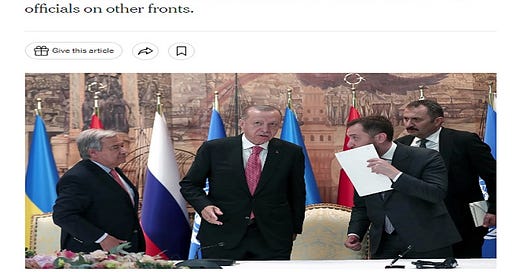Who’s The Real Troublemaker: Turkiye Or The US?
The narrative of “Turkish trouble” isn’t new since it’s been circulating around the West for the past half-decade already at least since the failed summer 2016 coup against President Erdogan that he blames on a radical US-based cleric who his government officially designated as a terrorist.
The New York Times published a provocative piece over the weekend citing unnamed Biden Administration officials titled “Turkey’s Leader Remains a Headache for Biden Despite Aiding in Ukraine Deal”. The article claims that this West Asian NATO member is causing trouble for the alliance and its American leader. It misportrays President Recep Tayypid Erdogan as a maverick leader who’s supposedly exploiting demagogic populism in his foreign policy as a distraction from his domestic problems.
The four examples include his tough negotiations over Finland and Sweden’s plans to join the bloc, the Turkish leader’s recent meeting with his Iranian and Russian counterparts in Tehran, Ankara’s publicly proclaimed plans to launch another military intervention into Northern Syria, and its S-400 air defense deal with Moscow. The outlet then cites some congressional representatives who believe that this behavior contradicts Turkiye’s moral and political obligations under NATO.
There’s concern that this country might ultimately still block Finland and Sweden’s membership requests before the completion of their admission process if the US doesn’t first sell it F-16s like US President Joe Biden promised. The problem, however, is that the American leader isn’t the sole decisionmaker in this respect since the agreement would first have to pass through Congress, for which no clear timeline is given, nor any solid guarantee that it’ll be approved due to dissenting members.
The narrative of “Turkish trouble” isn’t new since it’s been circulating around the West for the past half-decade already at least since the failed summer 2016 coup against President Erdogan that he blames on a radical US-based cleric who his government officially designated as a terrorist. In the years since, Turkish foreign policy has become strategically autonomous of its traditional Western allies and even sometimes openly at odds with it. This, however, doesn’t mean that Turkiye’s the one causing trouble.
Rather, an objective analysis of Turkish-Western relations and especially Turkish-American ones reveals that the inverse is true: it’s the West and particularly the US that’s the real troublemaker in this relationship. To explain, Turkiye is the successor state of the Ottoman Empire, which was one of the most well-known major countries in history. This modern-day nation is laser-focused on restoring its former strength and prestige, to which end it prioritizes the pursuit of its national interests.
There’s nothing wrong with that either so long as this isn’t done at any third party’s expense, which is debatable in some of the contexts within which certain policies have been practiced such as its Syrian operations. Nevertheless, the examples mentioned in the New York Times’ article don’t go against objective Western or American interests, but only their subjectively defined ones that are being promulgated to preserve their declining unipolar hegemony precisely at Turkiye’s expense.
Regarding the first example of the four mentioned in the article, Turkiye has the right to defend itself from what its internationally recognized government regards as terrorist threats, especially those supported from abroad. Ankara accuses Helsinki and Stockholm of providing financial and political support for Kurdish groups that it considers terrorists, hence why President Erdogan made the tough demands that he did of their leaders in exchange for supporting their NATO membership admissions.
As for the second, as the head of state, he has the right to meet with his foreign counterparts whenever he’d like. Iranian President Ebrahim Raisi is the leader of a neighboring state while Russian President Vladimir Putin helps responsibly regulate Russian-Turkish competition in their surrounding regions. Under no circumstances is President Erdogan obliged to unilaterally concede on Turkiye’s objective national interests by eschewing meetings with either just because it offends NATO and the US.
On the topic of its planned Syrian operation, Turkiye has articulated the national security reasons behind this potential mission, which is to destroy groups that Ankara considers to be terrorists. As it turns out, these same groups are literally armed by its American ally, who considers them to be so-called “freedom fighters”. Washington didn’t have to support organizations that it knew Turkiye considers to be irredeemable national security threats, thus making this a needless provocation in their relations.
Finally, Turkiye sought out Russia’s S-400 air defense systems because they’re regarded as among the best in the world. Ankara could no longer count on Washington to ensure its national security interests after the US armed Kurdish groups that Turkiye considers to be terrorists and hosts a radical cleric who President Erdogan accuses of plotting the failed summer 2016 coup against him. Unlike what some US conspiracy theorists claim, these defensive systems won’t allow Russia to secretly spy on NATO.
With this insight in mind, it’s clear that the New York Times’ piece is an unfriendly information product that attempts to twist the truth by misportraying Turkiye as the troublemaker and not the US. The reality is that it’s America that betrayed its ally by arming groups that Ankara considers to be terrorists and has since continued to aggressively demand that its partner unilaterally concede on a wide array of issues connected to its objective national interests in order to please the declining unipolar hegemon.
The times have changed, however, as the emerging multipolar world order has emboldened countries to put their interests first instead of submitting to others’ demands. This importantly includes NATO members like Turkiye, which has the alliance’s second-largest military. This trend is natural and aligns with the times. It’s also responsible for stabilizing International Relations by imbuing them with a degree of predictability. By spinning this as problematic, the New York Times is simply spewing propaganda.




